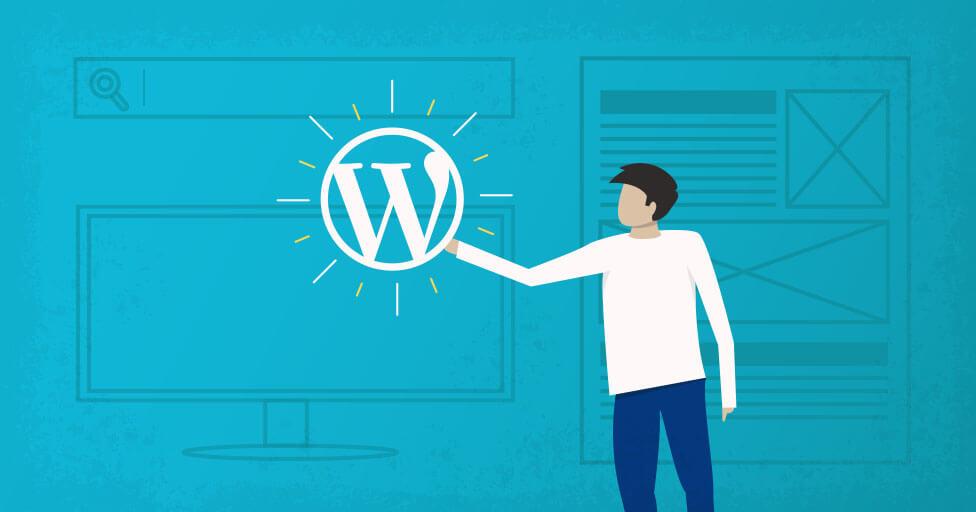
As an open source CMS (content management system) with over sixteen years under its belt and still going strong, WordPress is by far the most popular CMS on the web today. Roughly 34% of ALL websites on the web are run on WordPress, and 60% of sites running a CMS utilize WordPress, according to W3tech.com.
WordPress is among the most popular ways to create a website. While WordPress isn’t perfect in every situation, there are a number of instances where it does excel.
Here are four reasons why we love WordPress.
1. Cost, Customization & Support
As an open source project, WordPress is completely free to run on your website. You never need to pay a license fee to use it, whether you’re a small startup business or a Fortune 500 company. Being open source means hundreds of people all over the world are working on the platform code, so it is constantly being improved and evolving. That said, it’s not hard to find support for any WordPress issues you might encounter. It’s easy to find developers, and there are innumerable tutorials and support forums out there to help. And being open source means you can alter the source code in any way you need to fit what you are going for. Building your website on WordPress means you’re joining a lot of good company: musicians The Rolling Stones, Sony Music, the blogs for The Washington Post, among many others all utilize WordPress as their content management system.
2. Search-Engine Friendly
Using a framework that is easy for search engines to crawl is of crucial importance. WordPress handles this with ease, taking care of reportedly 80-90% of all Google’s crawling issues right out of the box, according to Matt Cutts of Google. WordPress makes it easy to customize your permalinks, lending itself to a highly SEO-friendly website structure. Image optimization and clean code play their part in WordPress’s SEO superpowers too. And given WordPress’s mobilefirst attitude, you’re sure to rank. While WordPress began as a blogging platform, it’s now used more as an outright website platform, although you can easily do both from within the same website. Having a blog on your business website means more updated content (if you do it the right way and keep it updated), which also improves SEO scores.
3. Mobile Ready & Responsive
Nearly all WordPress themes, both Free and Premium, are responsive right out of the box. This is a great thing for your business website, considering in 2015 Google began penalizing websites that weren’t responsive. In this day and age, if your website isn’t responsive, it’s almost not worth having: in 2014 mobile internet browsing overtook desktop browsing, according to comScore. In fact, more Google searches are done on mobile devices than on desktop. This means your business website is generally the first impression a potential customer will have of your company, making it of dire importance to look good on the small screen. Terms involving “WordPress” itself are searched for more than 2,740,00 per month alone, according to kwfinder.com.
4. Maintain Your Website, Simply
If you can edit a Microsoft Word document, you can edit your WordPress website. It’s designed so that even the most nontechnical people can maintain and update it. Because WordPress was originally built as a blogging platform, it’s designed with ease of updating in mind. And you aren’t just limited to adding text. With robust features and extensive multimedia support, it’s easy to embed YouTube videos, Vimeo videos, Audio files, tweets, SoundCloud files, and images of all sorts without the headache. With a builtin updater, WordPress alerts you when new versions, as well as plugin updates and theme updates, are ready for deployment with just the click of a button right from your Dashboard. You can have as many users on the site as you want as well, set at various user roles so access to certain sections of your website are editable by some and hidden from others.
It’s easy to see why WordPress has exploded in popularity in the past sixteen years since it’s inception. Being naturally search-engine friendly, responsively inclined, and free for anyone and their dog to use have made it an obvious choice for companies and individuals of all types. While it may not be a perfect fit for every website need, the flexibility of the WP framework lends itself well to most. Almost endlessly customizable, easily translatable (WP supports 56 official different languages translations), and with 40,000+ WordPress plugins in the official directory make it easy to extend your website as needed.
That said, there are a few potential pitfalls for WordPress.
It’s important to note that while WordPress is an excellent choice of CMS for many situations, it isn’t the right choice for all website needs. Any experienced web developer knows it’s important to pick the right tool for the job at hand.
1. Spam
We all know and deal with spam on almost any given day. Because WordPress was originally built as a blog posting platform, it’s something of a magnet for spam robots. There are tools you can set in place to help eliminate spam, but it’s still something you’ll likely have to deal with when building a website on WordPress.
2. Problems with Plugins
WordPress plugins are a great way to enhance the functionality of your website. There are plugins out there that do just about anything, from enabling event calendars on your website to building interactive forms- really, just about anything you can think of, there’s probably a plugin for it. However, plugins sometimes can cause issues within WordPress websites. Considering anyone (yes, anyone,) can create a WordPress plugin which can be added to the plugin repository, there aren’t a lot of checks and balances, and sometimes these plugins are poorly coded. Poorly coded plugins can add extra bloat to your website, affecting page speed load times and even exposing you to security risks. When building a WordPress website, it’s important to use reputable plugins.
3. Updates
WordPress regularly releases core updates, improving the platform and patching security holes. But sometimes, WordPress updates- whether a core update, theme update, or plugin update- can occasionally break your website. When building with WordPress, it’s essential to use a child theme to avoid this very problem when it comes to updating themes. It’s important to keep your site updated, but you will likely have to invest a bit of time periodically to do so. Active management from security threats is a must, because WordPress’s popularity also makes it a target for hackers.
4. Workflows and delivery environments.
Complicated publishing workflows aren’t as easy to accommodate in WordPress, and there’s really not a mature staging to production workflow- especially when you factor in plugin updates. If your website needs to support an enhanced workflow, WordPress may not be the best choice.
As we’ve pointed out in this article, WordPress is a great tool for building websites, albeit not always the best choice. In the world of content management systems, there’s a lot of competition from CMS solutions like Drupal, Joomla, Kentico, and many more. Choosing the right CMS for your business website can be a daunting task. But have no fear! At MBB, we’re well versed in all types of content management systems and can help you narrow down your decision of which to go with. Interested in learning more about how we can help you build the best business website possible? Reach out to us for more info; we’d love to hear from you.
Sources:
WordPress
SurreyStreeter
CodeInWP
SearchEngineLand
Kinsta
W3Techs
WPVIP
Subscribe to our newsletter
Get our insights and perspectives delivered to your inbox.


